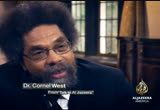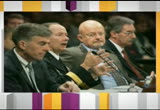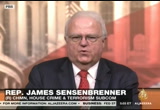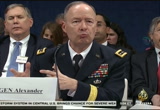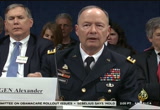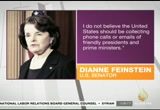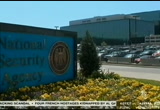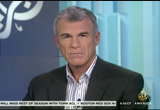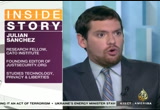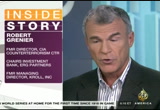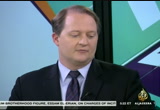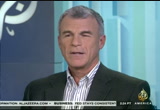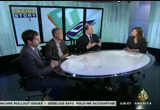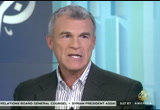tv Inside Story Al Jazeera October 30, 2013 5:00pm-5:31pm EDT
5:00 pm
is a beautiful thing to behold. >> al jazeera america, there's more to it. >> this is al jazeera america live from new york city. this is tony harris with today's top stories. kathleen sebelius was grilled for three hours on the healthcare exchanges. she testified that problems will be fixed. president obama is praising his plan for helping the uninsured and today said it is not a failure. he gave a speech in boston since massachusetts' health plan was the template for the affordable care act. his speech was interrupted by protesters. [ hecklers ]
5:01 pm
>> so here's what happened. the president was speaking and the protesters were asking for the president to address climate change issues. the president made light of the situation and said the demonstrators were at the wrongally. facebook investors gave people a lot to like this morning. they build out wall street estimate. advertising revenues are at 66% with half of that coming from ads on mobile devices. and those are the headlines. i'm tony harris. "inside story" is next on al jazeera america. >> the nation's top spies deny they've gone rogue and insist they're doing their job of keeping america safe. on tonight's inside story balancing security and liberty in the eye of a political storm.
5:02 pm
>> hello, i'm libby casey. what is usually secret is out in the open tonight, and the national security agency is on the defensive on multiple fronts. the nsa surveillance practices at home and abroad have been front page news afte after the s from nsa contractor edward snowdon. now, bills are in the works in the house and senate that would rein in the spy masters. tonight on inside story we'll take a closer look at the nsa since 9/11, including its mission, it's practices, and it's future. but first this background. >> director keith alexander. >> reporter: demand for
5:03 pm
intelligence gathering reform are growing on capitol hill over the wake of revelations of massive information gathering. there has been crafted buy partisan legislation to end the collection of puck phone records and the government only focus on foreigners who pose threats. 12 years later the continuing disclosures of nsa surveillance has pushed them to try to rein in the broad sweep of intelligence gathering. appearing on pbs last night. >> there has to be a balance between privacy and security. the nsa and their supporters in the congress have said let's forget about privacy. let's forget about civil
5:04 pm
liberties. i can't do that. what has made america a different country is our court reports for these types of issues. what the nsa has been doing is a lack of oversight and has destroyed trust with our allieser particularly those in europe. >> front and center in a rare public hearing with the head of the nsa, general keith alexander and head of intelligence james clapper. he did not denial gas stations that the u.s. lived in on the private phone of germany's chancellor angela merkel, but in an emotional opening statement where he spoke as he said from the heart general alexander explained his view that nsa counter terror efforts are keeping america safe. >> let me give you thoughts here. i think this is important for our country to think about this. if you look at the trends in the
5:05 pm
ct arena in 2012 it was the highest globally it has been ever, over 15,000 people killed. in just this last month, 2,336 people were killed, 1510 injured in pakistan, afghanistan, syria, iraq and nigeria, yet there has not been a mass casualty in the u.s. since 2001. that's not by luck. they didn't stop hating us. they didn't say they were going to just forgive this. they continuing to try. it is the great members of the intelligence community, our military, our law enforcement, that have stood up and said this is our job. and we do it with our partners and our allies. and it has been a great partnership. >> while members on both
5:06 pm
political sides of the house intelligence committee express doubt and outrage some thought to defend the spying. >> do you believe that the allies have conducted or at any time conducted espionage activity against the united states of america. >> absolutely. >> meanwhile, other intelligence gathering reforms are in the works. democratic senator dianne feinstein and long time defender of america's surveillance operation has called for a total review of all intelligence programs. she said, quote, unless the united states is engaged in hostility against a country or there is an emergency need for this type of surveillance, i do not believe that the united states should be collecting phone calls and e-mails of friendly presidents and prime ministers. for his part president obama stressed a need to find a
5:07 pm
balance between what is technically possible and what is right. >> what i'm confirm something that we're undergoing a complete review of how our intelligence operates out of the country. there are strict laws governoring what we do internally. that was the initial concern brought by snowdon disclosures. internationally there are less constraints on hou how our intelligence teams work. but as technology develops and expands, and the capacity for intelligence gathering becomes greater we have to make sure that we do things in the right way and reflect our values. >> reform efforts in congress includes the addition of a privacy advocate it to the fisa court. this would dress civil liberties
5:08 pm
concerns held by many americans since they learned of the massive number of phone records in america's spy agency. when we come back we'll talk about what change might mean here and abroad and potential changes to u.s. civil liberties. we'll be right back. >> the shooting happened about 30 minutes ago. >> companies... >> the remains of the fire are still everywhere here. >> the powers that be at home and around the world... >> not only do they not get compensation but you don't even have to explain why? >> well thats exactly what i said. >> we question authority. >> so you said we could get access... >> that's enough! >> ... and those affected. >> investigative journalism at it's toughest.
5:10 pm
>> intelligence gathering national security and privacy. we offer but unable to secure appearances from representatives sesenbrunner, leahy or general alexander for tonight's program. joining us for congress' response is julian sánchez. shane harris, senior writer of "the watchers." and bob genier. john, we're seeing movement in congress now to bring about change, some restrictions to what the intelligences can do.
5:11 pm
there was an attempt to rein in abilities. but it didn't go anywhere. what changed now and why is it different? >> there have been leaks and certain information that has been piled on. there was significant attempt back in the summer. what surprises people is that more people sided with reining in the nsa than we expected. including people who traditionally might not have been on that site. i think the revelations about monitoring foreign leaders communications may be plays into this to some degree. i think there is a growing anxiety amongst some members not only that the nsa may be going too far but maybe they themselves have not been completely briefed or maybe not availed themselves of the information to find out what those programs are about. i think you're seeing accumulation over time giving rise to put the brakes on or tinkering on the edges so
5:12 pm
congress feels comfortable what they're doing. >> we're talking about spying on foreign leaders but also the collection of information on american citizens. we heard the director from the nsa. we heard james clapper defend that saying that's been done for a long time. do you think its ironic that this is really feeding the push to change things? even as they're defending it? >> i don't know that this is feeding it i think all the major reform bills on the table now were written before it happened, it's ironic that dianne feinstein has been one of the strongest defenders and now expressing outrage because her constituents are being spied on, but because angela merkel is. while these people don't have constitutional rights and the u.s. constitution, to alienate
5:13 pm
those foreign leaders creates a immediate problem for intelligence gathering. >> it's all about politics. >> it is largely politics. you can be assured of that. i this in several respects. what is driving some of these european leaders they have to deal politically in terms of their own political context. similarly here in the u.s. dianne feinstein and maybe other members of the committees are reacting to the image that they were not fully informed. i can assure you if they wanted to be fully informed they would have been. i spent a lot of time dealing with the oversight committees and they do not afail themselves of the information that would be available to them otherwise. i guess i see things differently. i see them precisely the opposite way. i do not believe for one moment that officials in other allied countries are going to some how
5:14 pm
cease cooperation in virtue of the fact that angela merkel's cell phone may or may not have been monitored. i'm sure they'll want this to go away. this is very much a politically driven thing. >> let's talk about the legislation being drilled town andownand proposed. how unusual is this. >> every time the patriotic has come up to be renewed has bee ts never been significant effort to push them back and quite the opposite, expand some of the laws. but i'm somewhat skeptical of this. i think you might see some changes to circumstances under which certain information can be accessed. let's say there may be other kinds of requirements or barriers that are put in the way
5:15 pm
of the barriers. there may be a way to hear some of these in secre secret. when you look at the grand scream of things we're not really talking about changing what the nsa fundamentally daughterfundamentally does.to mw of these things. they're significant. not just cosmetic but i don't think you're talking about wholesale reform of this process. >> how do you see the changes they're proposing? >> i think the freedom act, counterpoint to usa operator which sensenbruner was the author of. across the board under a whole lot of authorities that uses these relevant standards way was broadly interpreted to allow a collection of all americans phone records and requires some
5:16 pm
kind of direct maybe at one removed but some kind of concrete nexus to a terror suspect. really for the first time since 9/11 says the wholesale approach is not going to work at least inside the united states. you're going to have to go back to the old fashioned at least somewhat targeted demands for information instead of sweeping everything in and sorting it out laird. >> will that limit their effectiveness? >> i think as a practical matter it could. as it's been pointed out it does not mean that they're pro scribed from doing what it is that they want to do i think the practical effect is that it will slow things down. you have to take a particular individual let's say he's known as a terrorist. he has a certain range of telephone related activity, internet related activity. then they can take one step out
5:17 pm
and say who are the individuals with whom he's in contact? how many of these do we think are significant? there has to be a check in the system so you have to demonstrate the relevance of collection against these individuals. then it becomes more difficult still when you take the next step out. increases the chances that a relatively obscure link will be missed by nsa and the intelligence community, in any case even if they do follow the correct change it will slow things down. i think that's what the community is concerned about. >> this is one hop for free. if you have a suspect their direct contacts, their records are part of the package you can get all at once. but also i think part of the reasons some of this has picked up steam is the first days and weeks after these revelations began we have these ambitious claims of 54 terror events disrupted, and over time it's becoming increasingly clear that the actual benefit from this
5:18 pm
program is not that impressive. the one kind of case they can say this definitely helped in that instance was there was a guy giving material support to al-shabab. and osending money overseas. he should be sent to jail but to get everybody's records, it may not be that tradeoff. >> is the benefit coming from the phone, meta-data or collecting internet information. >> from the nsa's perspective that's difficult to give an answer. what people tonight always understand the agency does not always measure its success. it's how much information are we collecting that is being put into reports that may be useful to policymakers and how they're serving their customers. well, how many times was the meta-database actually successful. there may be case where is they can make a pretty good claim that it must be a good part of
5:19 pm
the mix. in general they don't necessarily calculate that way so it's difficult for them to say there is cause and affect by collecting the data but there is lose to give up access because what if there is data that is proven to be a key ingredient in the mix. >> how is that proven. >> i think it's cold comfort for americans. but the vast majority of cases ns a nobody else cares a wit what the contents are. what they're looking for are patterns of connection of these individuals. >> when we come back you're watching inside story. stay with us. uncovers unheard, fascinating news stories? >> they share it on the stream. >> social media isn't an
5:20 pm
5:22 pm
>> welcome back to inside story. we're continuing our discussion about the nsa and congress privacy and security. still with us is julian sánchez of the cato institute. shane harris, and bob grenier formerly of the c.i.a. the "washington post" broke a story that the nsa has secretly broken into community links by g mail, google and yahoo. how significant is this? >> i think it's significant. it adds more to the understanding that we've been gathering over time how exactly the nsa gets information from companies. so there are two sides to this now. there is one program known as prism which allows the agency to get wha what has been describeds direct access. but to store communications basically. stored information. what this story in the post seems to show is that the nsa is
5:23 pm
grabbing information that as it moves through yahoo and google data centers located around the world and public internet and there are junction points where they are grabbing information. what i think this gets at though is it helps us understand more about how the information is being gathered but under scores how important these companies is to surveillance. if the companies suddenly stopped cooperating i don't think the nsa would be blind but it would be like putting out one eye. it's important for them. >> what is the responsibility on behalf of the companies. we're talking about privacy issues, and capitol hill is working towards changes. what is the corporate responsibility? >> they have a legal responsibility to aid, but now that it's gone public, and
5:24 pm
companies that have international user base recognize that they depend on trust. their entire model involves getting our most sensitive data, and if people think they're not secure there the companies are going to hurt us. i saw a recent estimate that over the next three years just the american cloud sector stands to lose $23 billion. overseas people are shifting to other solutions because they feel their data is not safe. >> what about responsibility along the rest of the chain? what is the white house's responsibility and what is the nsa's responsibility to balance privacy and security. and president obama getting involved, making sure that he knows what is going on? >> this gets tricky, especially when you start talking about presidential knowledgeability. i don't think we want our presidents spending the amount of time that would be necessary
5:25 pm
to know everything little thing that nsa is doing and the rest of the intelligence community. but there is a big, big political component of this. what is difficult and what is challenging for the intelligence community is that the standard, the gold post, if you will, is constantly being moved. something like this happens and then people say well, maybe we're not comfortable with this, and we need to do more to protect citizens privacies. fine, you move the bar down. and god for bid there is an airline that goes down in detroit, as it almost happened a few christmas ago, and then the bar moves in the opposite direction, and now they have to understand why it was that they haven't been able to collect the dots. >> james clapper, director of national intelligence said that the u.s. does not spy on anyone but for valid purposes. he even use air quotes, is
5:26 pm
capitol hill buying that? is the american public buying that? >> the members of these oversight committees do have an obligation and opportunity to learn more about these programs. they're careful about how far they want to go in grilling some of these officials because it might blow back to them, well, why weren't you asking the questions you should have been asking. whether the public is buying this or not, it seems that the public is evenly split should the government have these authorities or should they not or should they be reined in, but a good number of of the public feel that politicians are not giving them all the information. they're giving direct answers to the question they're being
5:27 pm
asked, bu, but that's what they. they go up and answer the questions that they're asked. i don't think we should expect them to expose a lot of secrets in a setting like that. >> we heard speaking from the heart. we heard this pushing the papers aside and try to talk directly to the panel members. bob, how do they try to get americans invested in what they're doing while they an cant or won't give information on tools and techniques. >> it's difficult to do. like many other stories it's very much on the presentation. looking at this as a former intelligence officer, simple passive collection of information that is out there in the easter, let's say the cellphones of the germany chancellor, well gosh, if the americans are doing it, surely the russians and the chinese are doing it.
5:28 pm
does the u.s. have an interest of knowing the thoughts of a very important foreign leader? do they want to be able to present that information to the president? >> with respect to spying on foreign leaders, i understand there is a diplomatic problemish but that is the mission of the nsa. >> what is the difference between planting a bug and eavesdropping on a phone call. >> not especially. >> i think part of it has to do with one's legitimate expectation. if the german chancellor is discussing sensitive things and it's sensitive enough to be discussed on an encrypted phone she gets everything that is coming to her. quite frankly there are u.s. officials who ought to be using encrypted things and don't. these little mistakesser--the germans were sharing information with the americans and
5:29 pm
inadvertently included they were monitoring the communication of some 300 americans. this happens. we can hear claude rains say i'm shocked, i'm shocked. >> i'll get a final word from shane harris, is that fair? >> is there an immorality to espionage? i'm not sure there. our government authorizes our government to do things that in their countries are illegal. that's espionage. that's the nature of the business. people are getting so much detail of what that looks like and it's naturally raising questions, but this is how it's been for a long time. >> thank you so much. that's it for now from the team in washington, d.c. and from me, libby casey. thanks for watching.
5:30 pm
>> jose antonio elena rodriguez was 16 when he was killed with a bullet through the head by the united states border patrol. nine more shots went into body, as he lay on the ground in his hometown, nogales mexico. the bullets fired from the top of this cliff in arizona traveled through an international boundary, and into a legal vacuum. the agent has never been named. >> josan
142 Views
Uploaded by TV Archive on

 Live Music Archive
Live Music Archive Librivox Free Audio
Librivox Free Audio Metropolitan Museum
Metropolitan Museum Cleveland Museum of Art
Cleveland Museum of Art Internet Arcade
Internet Arcade Console Living Room
Console Living Room Books to Borrow
Books to Borrow Open Library
Open Library TV News
TV News Understanding 9/11
Understanding 9/11